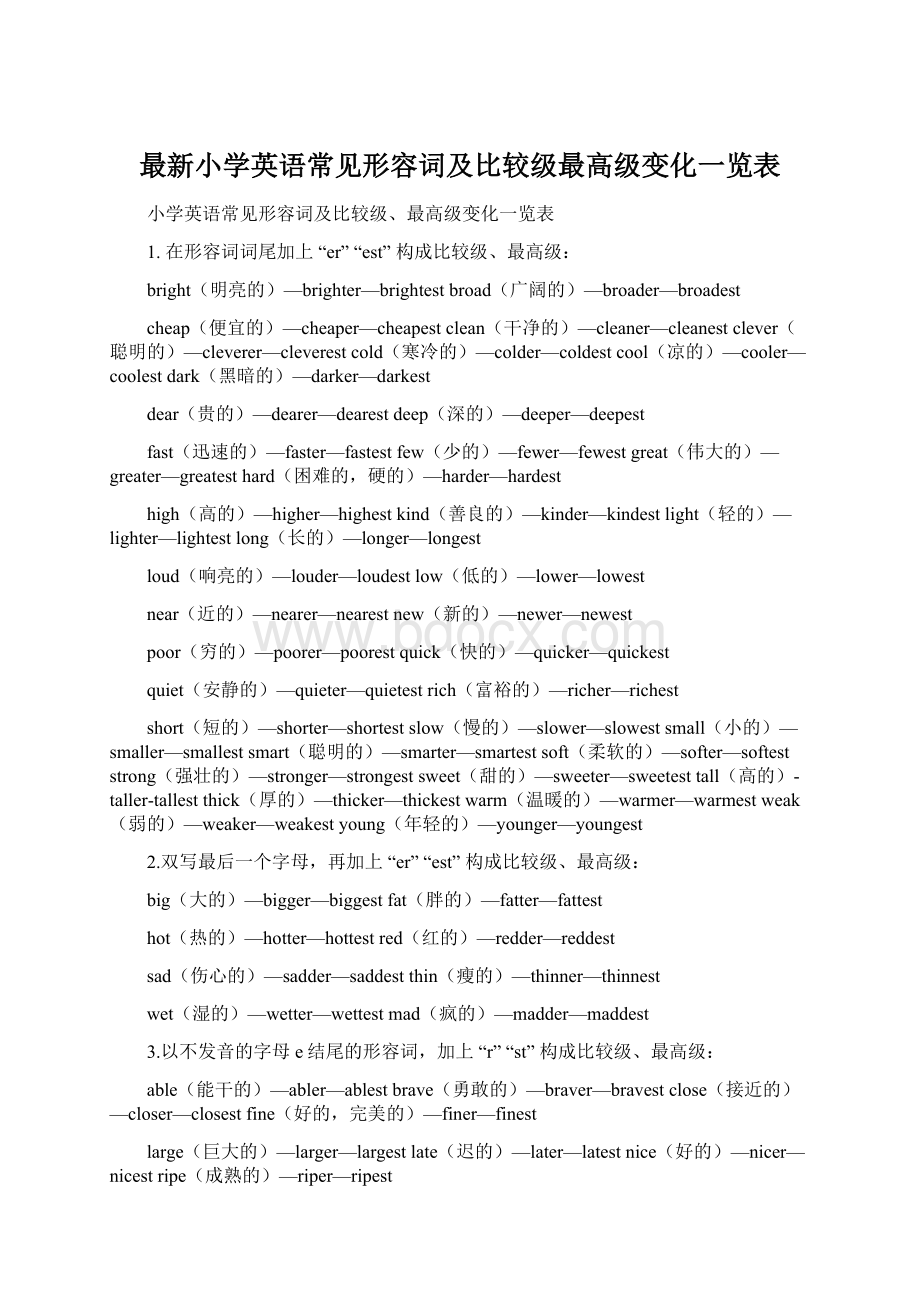最新小学英语常见形容词及比较级最高级变化一览表.docx
《最新小学英语常见形容词及比较级最高级变化一览表.docx》由会员分享,可在线阅读,更多相关《最新小学英语常见形容词及比较级最高级变化一览表.docx(7页珍藏版)》请在冰豆网上搜索。

最新小学英语常见形容词及比较级最高级变化一览表
小学英语常见形容词及比较级、最高级变化一览表
1.在形容词词尾加上“er”“est”构成比较级、最高级:
bright(明亮的)—brighter—brightestbroad(广阔的)—broader—broadest
cheap(便宜的)—cheaper—cheapestclean(干净的)—cleaner—cleanestclever(聪明的)—cleverer—cleverestcold(寒冷的)—colder—coldestcool(凉的)—cooler—coolestdark(黑暗的)—darker—darkest
dear(贵的)—dearer—dearestdeep(深的)—deeper—deepest
fast(迅速的)—faster—fastestfew(少的)—fewer—fewestgreat(伟大的)—greater—greatesthard(困难的,硬的)—harder—hardest
high(高的)—higher—highestkind(善良的)—kinder—kindestlight(轻的)—lighter—lightestlong(长的)—longer—longest
loud(响亮的)—louder—loudestlow(低的)—lower—lowest
near(近的)—nearer—nearestnew(新的)—newer—newest
poor(穷的)—poorer—poorestquick(快的)—quicker—quickest
quiet(安静的)—quieter—quietestrich(富裕的)—richer—richest
short(短的)—shorter—shortestslow(慢的)—slower—slowestsmall(小的)—smaller—smallestsmart(聪明的)—smarter—smartestsoft(柔软的)—softer—softeststrong(强壮的)—stronger—strongestsweet(甜的)—sweeter—sweetesttall(高的)-taller-tallestthick(厚的)—thicker—thickestwarm(温暖的)—warmer—warmestweak(弱的)—weaker—weakestyoung(年轻的)—younger—youngest
2.双写最后一个字母,再加上“er”“est”构成比较级、最高级:
big(大的)—bigger—biggestfat(胖的)—fatter—fattest
hot(热的)—hotter—hottestred(红的)—redder—reddest
sad(伤心的)—sadder—saddestthin(瘦的)—thinner—thinnest
wet(湿的)—wetter—wettestmad(疯的)—madder—maddest
3.以不发音的字母e结尾的形容词,加上“r”“st”构成比较级、最高级:
able(能干的)—abler—ablestbrave(勇敢的)—braver—bravestclose(接近的)—closer—closestfine(好的,完美的)—finer—finest
large(巨大的)—larger—largestlate(迟的)—later—latestnice(好的)—nicer—nicestripe(成熟的)—riper—ripest
rude(粗鲁的)—ruder—rudestsafe(安全的)—safer—safeststrange(奇怪的)—stranger—strangestwide(宽广的)—wider—widest
wise(睿智的,聪明的)—wiser—wisestwhite(白的)—whiter—whitest
4.以字母y结尾的形容词,把y改为i,再加上“er”“est”构成比较级、最高级:
busy(忙碌的)—busier—busiestdirty(脏的)—dirtier—dirtiestdry(干燥的)—drier—driestearly(早的)—earlier—earliest
easy(容易的)—easier—easiestfriendly(友好的)—friendlier—friendliest
funny(好玩的)—funnier—funniesthappy(开心的)—happier—happiesthealthy(健康的)—healthier—healthiestheavy(重的)—heavier—heaviest
hungry(饿的)—hungrier—hungriestlazy(懒惰的)—lazier—laziest
lucky(幸运的)—luckier—luckiestnaughty(调皮的)—naughtier—naughtiestnoisy(嘈杂的)—noisier—noisiestpretty(美丽的)—prettier—prettiest
silly(傻的)—sillier—silliestspicy(辣的)—spicier—spiciest
thirsty(渴的)—thirstier—thirstiestugly(丑的)—uglier—ugliest
5.双音节、多音节形容词,在单词前面加上“more”“most”构成比较级、最高级:
afraid(害怕的)—moreafraid—mostafraidbeautiful(美丽的)—morebeautiful—mostbeautifulcareful(仔细的)—morecareful—mostcarefulcheerful(开心的)—morecheerful—mostcheerfulcrowded(拥挤的)—morecrowded—mostcrowdeddangerous(危险的)—moredangerous—mostdangerousdelicious(美味的)—moredelicious—mostdeliciousdifficult(困难的)—moredifficult—mostdifficultexciting(令人兴奋的)—moreexciting—mostexcitingexpensive(昂贵的)—moreexpensive—mostexpensivefamous(著名的)—morefamous—mostfamousfrightened(受惊的)—morefrightened—mostfrightenedfrightening(令人害怕的)—morefrightening—mostfrighteninghard-working(勤奋的)—morehard-working—mosthard-workinghelpful(有帮助的)—morehelpful—mosthelpfulhonest(诚实的)—morehonest—mosthonestimportant(重要的)—moreimportant—mostimportantinteresting(有趣的)—moreinteresting—mostinterestingpolite(有礼貌的)—morepolite—mostpoliteterrible(可怕的)—moreterrible—mostterribletired(累的)—moretired—mosttired
6.不规则变化的形容词:
bad(坏的)—worse—worstfar(远的)—farther—farthest(far—further—furthest)good(好的)—better—bestill(病的)—worse—worst
little(少的)—less—leastmany(多的)—more—most
much(多的)—more—mostold(年老的)—older—oldest(old—elder—eldest)
well(好的,身体好的)—better—best
1.一般在词尾直接加er或est,
例如,tall-taller-tallest,long-longer-longest
2.以不发音的字母e结尾的单词在词尾直接加r或st,
例如,nice-nicer-nicest
3.以辅音字母+y结尾的词,把y变为i,再加er或est,
例如,heavy-heavier-heaviest
4.重读闭音节,末尾只有一个辅音字母,双写这个辅音字母,再加er或est,
例如,big-bigger-biggest
5.部分双音节词和多音节词分别在原级前加more构成比较级和most构成最高级,
例如,slowly-moreslowly-mostslowly;beautiful-morebeautiful-mostbeautiful
一、形容词、副词的比较级和最高级的构成规则
1.一般单音节词和少数以-er,-ow结尾的双音节词,比较级在后面加-er,最高级在后面加-est;
(1)单音节词
如:
small→smaller→smallestshort→shorter→shortest
tall→taller→tallestgreat→greater→greatest
(2)双音节词
如:
clever→cleverer→cleverestnarrow→narrower→narrowest
2.以不发音e结尾的单音节词,比较在原级后加-r,最高级在原级后加-st;
如:
large→larger→largestnice→nicer→nicestable→abler→ablest
3.在重读闭音节(即:
辅音+元音+辅音)中,先双写末尾的辅音字母,比较级加-er,最高级加-est;
如:
big→bigger→biggesthot→hotter→hottestfat→fatter→fattest
4.以“辅音字母+y”结尾的双音节词,把y改为i,比较级加-er,最高级加-est;
如:
easy→easier→easiestheavy→heavier→heaviest
busy→busier→busiesthappy→happier→happiest
5.其他双音节词和多音节词,比较级在前面加more,最高级在前面加most;
如:
beautiful→morebeautiful→mostbeautiful
different→moredifferent→mostdifferent
easily→moreeasily→mosteasily
注意:
(1)形容词最高级前通常必须用定冠词the,副词最高级前可不用.
例句:
TheSaharaisthebiggestdesertintheworld.
(2)形容词most前面没有the,不表示最高级的含义,只表示"非常".
Itisamostimportantproblem.
=Itisaveryimportantproblem.
6.有少数形容词、副词的比较级和最高级是不规则的,必须熟记.
如:
good→better→bestwell→better→best
bad→worse→worstill→worse→worst
old→older/elder→oldest/eldest
many/much→more→mostlittle→less→least
far→further/farther→furthest/farthest
二、形容词、副词的比较级和最高级的用法
1.“A+be+形容词比较级+than+B”意思为“A比B更……”.
如:
Thistreeistallerthanthatone.这棵树比那棵树高.
注意:
①在含有连词than的比较级中,前后的比较对象必须是同一范畴,即同类事物之间的比较.
②在比较级前面使用much,表示程度程度“强得多”.
如:
Awatermelonismuchbiggerthananapple.
③very,quite一般只能修饰原级,不能修饰比较级.
2.“比较级+and+比较级”或“moreandmore+原级”表示“越来越……”
如:
Itbecomeswarmerandwarmerwhenspringcomes.
春天来了,天气变得越来越暖和了.
Itisgettingcoolerandcooler.
天气越来越凉爽.
Thewindbecamemoreandmoreheavily.
风变得越来越大.
Ourschoolisbecomingmoreandmorebeautiful.
我们的学校变得越来越美丽.
3.在含有or的选择疑问句中,如果有两者供选择,前面的形容词要用比较级形式.
如:
Whoistaller,TimorTom?
谁更高,Tim还是Tom?
4.“the+比较级……,the+比较级”,表示“越……越……”.
Themoremoneyyoumake,themoreyouspend.
钱你赚得越多,花得越多.
Thesooner,thebetter.
越快越好.
5.表示倍数的比较级用法:
①.Ais…timesthesize/height/length/widthofB.
如:
Thenewbuildingisthreetimestheheightoftheoldone.
这座新楼比那座旧楼高三倍.(新楼是旧楼的四倍高)
②.Ais…timesasbig/high/long/wide/largeasB.
如:
AsiaisfourtimesaslargeasEurope.
亚洲是欧洲的四倍大.(亚洲比欧洲大三倍)
③.Ais…timeslarger/higher/longer/widerthanB.
如:
Ourschoolistwicebiggerthanyours.
我们学校比你们学校大两倍.
6.形容词、副词的最高级形式主要用来表示三者或三者以上人或事物的比较,表示“最……”的意思.
句子中有表示范围的词或短语.如:
ofthethree,inourclass等等.
如:
Heisthetallestinourclass.
他在我们班里是最高的.
7."否定词语+比较级","否定词语+so…as"结构表示最高级含义.
Nothingissoeasyasthis.
=Nothingiseasierthanthis.
=Thisistheeasiestthing.
8.比较级与最高级的转换:
Mikeisthemostintelligentinhisclass.
Mikeismoreintelligentthananyotherstudentinhisclass
7.修饰比较级和最高级的词
1)可修饰比较级的词
①.abit,alittle,rather,much,far,byfar,many,alot,lots,agreatdeal,any,still,even等.
②.还可以用表示倍数的词或度量名词作修饰语.
③.以上词(除byfar)外,必须置于比较级形容词或副词的前面.
注意:
使用最高级要注意将主语包括在比较范围内.
(错)Tomisthetallestofhisthreebrothers.
(对)Tomisthetallestofthethreebrothers.
2)下列词可修饰最高级:
byfar,far,much,mostly,almost.
Thishatisnearly/almostthebiggest.
注意:
a.very可修饰最高级,但位置与much不同.
Thisistheverybest.
Thisismuchthebest.
(4)信息技术优势b.序数词通常只修饰最高级.
Africaisthesecondlargestcontinent.
2、Google网站www。
people。
com。
cn8.要避免重复使用比较级.
(2)东西全(错)Heismoreclevererthanhisbrother.
“碧芝”的成功归于他的唯一,这独一无二的物品就吸引了各种女性的眼光。
(对)Heismorecleverthanhisbrother.
新材料手工艺品。
目前,国际上传统的金银、仿金银制成饰品的销售在逐步下降,与此形成鲜明对比的是,数年以前兴起的崇尚然风格、追求个性的自制饰品--即根据自己的创意将各种材质的饰珠,用皮、布、金属等线材串出的品,正在各国的女性中大行其道。
(对)Heisclevererthanhisbrother.
9.要避免将主语含在比较对象中.
2003年,上海市总人口达到1464万人,上海是全国第一个出现人口负增长的地区。
(错)ChinaislargerthatanycountryinAsia.
3、竞争对手分析(对)ChinaislargerthananyothercountryinAsia.
“碧芝自制饰品店”拥有丰富的不可替代的异国风采和吸引人的魅力,理由是如此的简单:
世界是每一个国家和民族都有自己的饰品文化,将其汇集进行再组合可以无穷繁衍。
10.要注意对应句型,遵循前后一致的原则.
ThepopulationofShanghaiislargerthanthatofBeijing.
合计50100%Itiseasiertomakeaplanthantocarryitout.
11.要注意冠词的使用,后有名词的时候,前面才有可能有名词.
据了解,百分之八十的饰品店都推出“DIY饰品”来吸引顾客,一方面顺应了年轻一代喜欢与众不同、标新立异的心理;另一方面,自制饰品价格相对较低,可以随时更新换代,也满足了年轻人“喜新厌旧”的需要,因而很受欢迎。
比较:
Whichislarger,CanadaorAustralia?
Whichisthelargercountry,CanadaorAustralia?
Sheistallerthanhertwosisters.
Sheisthetallerofthetwosisters.